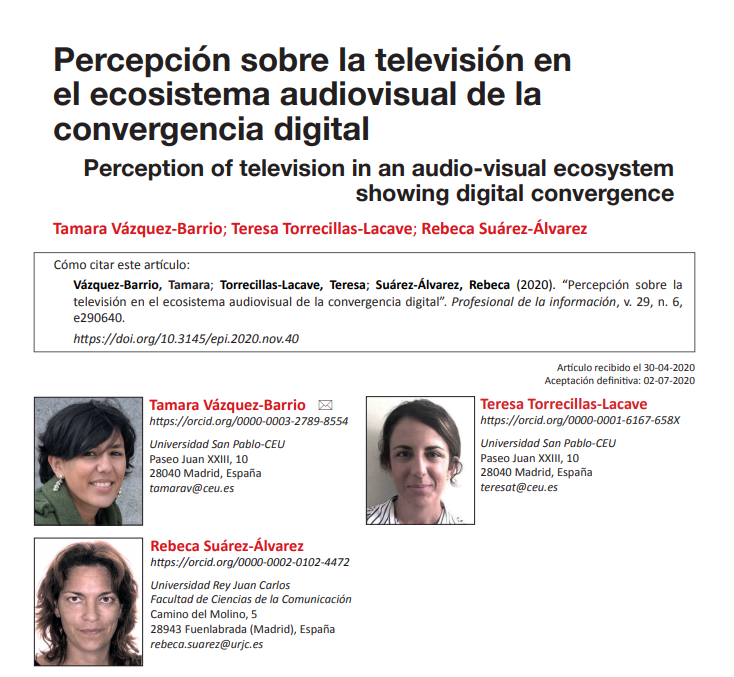
Percepción sobre la televisión en el ecosistema audiovisual de la convergencia digital
On Sale
€10.00
€10.00
Resumen: La televisión tradicional convive con formatos originados en internet, con el consumo bajo demanda, con la televisión de pago y con otras plataformas de distribución de contenido audiovisual. Los datos de audiencias muestran un descenso continuado de telespectadores y las tecnologías digitales permiten a cualquier ciudadano producir contenidos audiovisuales y distribuirlos para el consumo masivo a través de la Red. Ante este nuevo ecosistema audiovisual, el objetivo de esta investigación es comprobar si se pueden advertir signos de una crisis de la supremacía del televisor como medio de difusión de industria cultural. El desapego o indiferencia de los usuarios hacia la programación convencional evidenciaría un peligro para la televisión. Al contrario, el consumo de productos televisivos a través de otras pantallas implicaría el mantenimiento de las audiencias televisivas a través de internet. La investigación analiza las percepciones sobre la televisión mediante cinco grupos de discusión online. Se extraen tres conclusiones. La primera, que la televisión ocupa una posición relevante en la cotidianeidad de los participantes, incluidos los más jóvenes, a pesar de que las audiencias han descendido en los últimos años. La segunda, que la percepción sobre la televisión es positiva y se asocia a la desconexión, el relax y a un momento de reunión familiar compaginable con consumos individualizados en otros momentos del día. Tercera, el estudio demuestra el alto grado de compatibilidad entre internet y la pantalla del televisor porque surgen nuevas formas de consumo, pero se mantiene un interés predominante por los contenidos televisivos y de la gran industria cultural.
Abstract: Traditional television coexists with formats that originated on the internet, as well as on-demand consumption, paid television, and other audio-visual content distribution platforms. Audience data reveal a steady decline in television viewership, and digital technologies now allow any citizen to produce audio-visual content and distribute it for mass consumption through the internet. Given this new audio-visual ecosystem, the aim of this research is to ascertain whether there are any signs of a crisis regarding the dominance of television as a means of disseminating the products of the culture industry. Disinterest or indifference toward conventional programming by users would reveal a danger to the broadcast industry. In contrast, the consumption of television products through other channels would imply the retention of television audiences through the internet. This study analyzes perceptions regarding television through five online discussion groups. Three conclusions can be drawn: Firstly, television holds a prominent place in the daily lives of those who use it, including the youngest participants, despite the fact that audiences have declined in recent years. The second conclusion states that the perception of television is positive and associated with disengagement, relaxation, and family gatherings, which can be combined with individual consumption at other times of the day. As a third conclusion, this study reveals the high degree of compatibility between the internet and television screens, as new forms of consumption are emerging, yet there is still a predominant interest in content on television and from the mass culture industry.
Abstract: Traditional television coexists with formats that originated on the internet, as well as on-demand consumption, paid television, and other audio-visual content distribution platforms. Audience data reveal a steady decline in television viewership, and digital technologies now allow any citizen to produce audio-visual content and distribute it for mass consumption through the internet. Given this new audio-visual ecosystem, the aim of this research is to ascertain whether there are any signs of a crisis regarding the dominance of television as a means of disseminating the products of the culture industry. Disinterest or indifference toward conventional programming by users would reveal a danger to the broadcast industry. In contrast, the consumption of television products through other channels would imply the retention of television audiences through the internet. This study analyzes perceptions regarding television through five online discussion groups. Three conclusions can be drawn: Firstly, television holds a prominent place in the daily lives of those who use it, including the youngest participants, despite the fact that audiences have declined in recent years. The second conclusion states that the perception of television is positive and associated with disengagement, relaxation, and family gatherings, which can be combined with individual consumption at other times of the day. As a third conclusion, this study reveals the high degree of compatibility between the internet and television screens, as new forms of consumption are emerging, yet there is still a predominant interest in content on television and from the mass culture industry.
